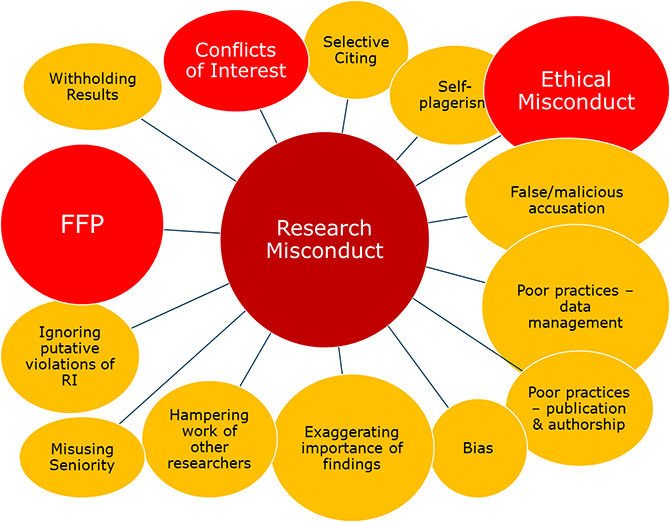Research misconduct is an international issue and arises in all disciplines: Humanities, Arts, Social Sciences, Business & Law as well as Biomedical, Physical and Engineering Sciences.
Misconduct in research is a bigger problem than you think and can have serious negative impacts in society and the research community and organisations. The negative impacts include but are not limited to:
- Negative impact on patients & study participants
- Negative impact on the wider population
- Negative impact in public trust in research
- Collateral damage to colleagues and the field of study associated with the guilty researcher(s)
- Financial Cost
Research misconduct includes but is not limited to:
- fabrication of data - making up results and recording them as if they were real.
- falsification of data - manipulating research materials, equipment or processes, or changing, omitting or supressing data or results without justification.
- plagiarism - using other people’s work and ideas without giving proper credit to the original source, thus violating the rights of the original author(s) to their intellectual outputs.
Additional examples of other unacceptable practices in research are illustrated below.

What do I do if I suspect research misconduct?
In the first instance it is extremely important to talk to and express your concerns to an appropriate person of seniority and provide supporting evidence if you suspect research misconduct.
Appropriate persons to approach with your concerns include
- Your supervisor/co-supervisor
- Principal Investigator
- Head of Unit
- UCC Research Integrity Officer
- Remaining silent is not an option - the long term consequences of research misconduct can have serious negative impacts.
Good communication is key to resolving concerns and issues and ensure that due process is followed where an investigation is warranted.
UCC Procedure in Cases of Suspected Research/Misconduct/Disputes
The UCC Code of Research Conduct outlines the procedure in cases of suspected research misconduct/disputes.
Procedure in Cases of Suspected Research/Misconduct/Disputes
- Complaints and resolution requests should be made in writing to the UCC Research Integrity Officer (RIO), Professor Ken O'Halloran.
- An acknowledgement of your complaint will be issued within five working days.
- The staff or student whom an alledged compliant is made against, is given the opportunity to repsond.
- The complainant reviews the responses and can provide information and documentation to support their case.
- Where possible and appropriate, the RIO will seek a resolution that does not require disciplinary action.
- If an informal resolution is not possible or appropriate, as deemed by the RIO, disciplinary procedures will apply with the relevant legislation.
As outlined in the UCC Code of Research Conduct:
- Investigative procedures will be conducted in a manner that is fair to all parties, and in accordance with relevant laws.
- A person accused of research misconduct (respondent) will be presumed to be innocent and respondent will not have any penalty imposed as unless and until the allegation is proven (although RIO may deem necessary to suspend/curtail research activities).
- Respondents will be provided with the opportunity to present their argument(s) or explanation(s) in both written and verbal form.
- Respondents will be afforded the opportunity to review any response(s) to their argument(s) to provide further information.
- A complainant will not suffer any penalty for making an allegation of research misconduct in good faith.
- Disciplinary action will be taken against complainants found to have made allegations in bad faith.
UCC Research
Aistriú Taighde
Contact us
Office of Vice President for Research & Innovation, 4th Floor, Block E, Food Science Building University College Cork, T12 K8AF
